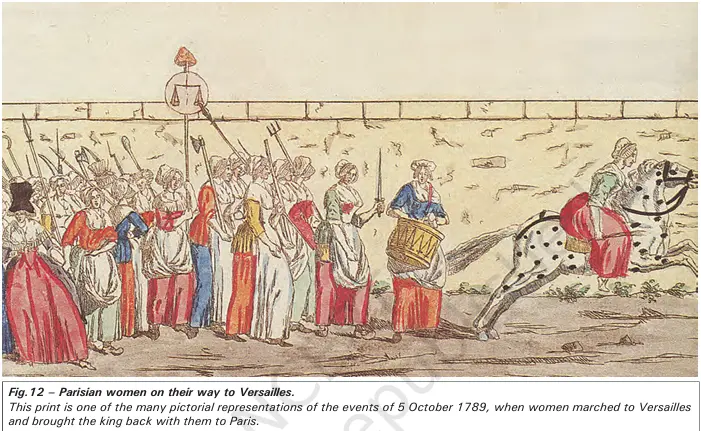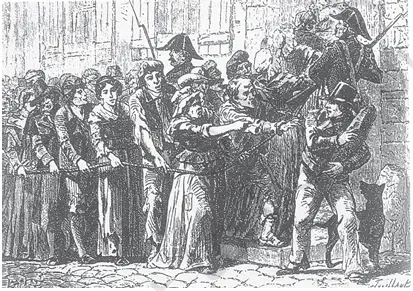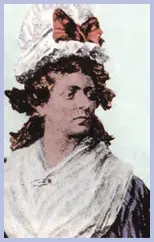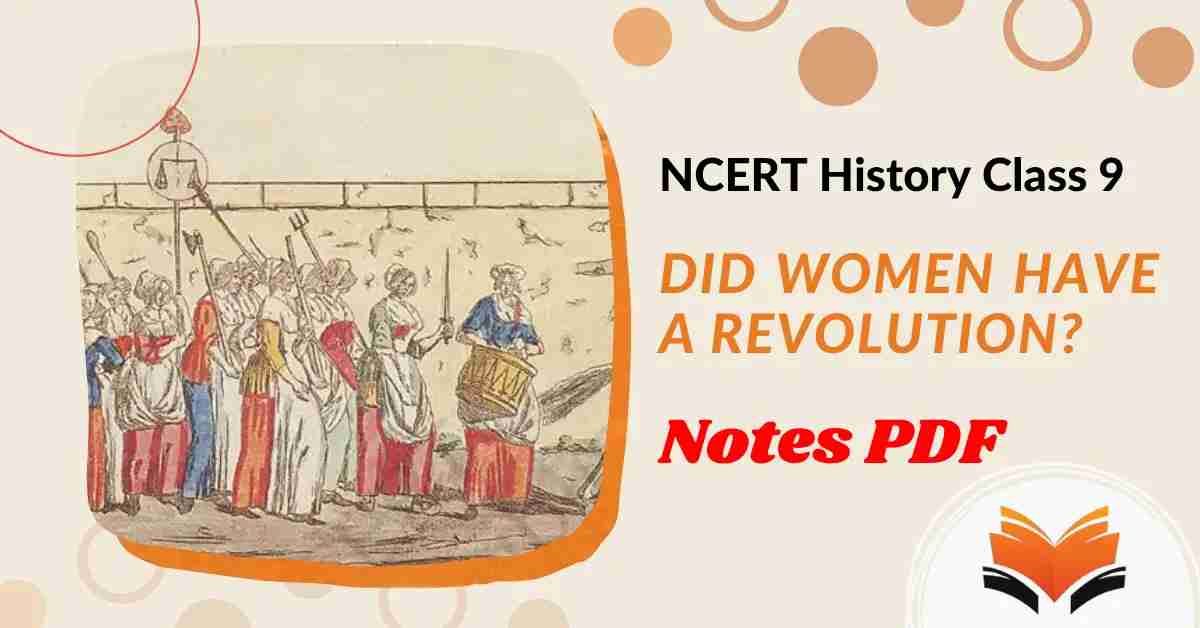Did Women Have A Revolution – Concept & Notes PDF
Topic & sub-topics covered: Did Women Have A Revolution? and MCQs Questions: The French Revolution (All single detail notes are exam-oriented).
We have discussed in-depth and exam-oriented pointers that can be asked in the board exam of class 9th about the “Did Women Have A Revolution?” from the NCERT History notes for class 9th chapter 1st “The French Revolution“.
Download the NCERT History for Class 9th Chapter 1 The French Revolution Notes PDF
NCERT History for Class 9th Chapter 1_ The French Revolution Notes & MCQ’s Question-Answer
Hey Class 9! The French Revolution chapter topic “Did Women Have A Revolution?” giving you a headache? Yeah, been there. So many names, dates, and those confusing terms like Estates General and Reign of Terror – it’s a lot, right?
When I first read this chapter, I honestly had no clue what was going on. Like… why were people storming a prison? Who even was Louis XVI? But once someone explained it in simple language, it finally clicked. That’s exactly why I made these notes – to help you get it without drowning in textbook blah-blah.
These notes are short, straight to the point, and written like a friend explaining stuff – not some robotic lecture. Whether you’re cramming before an exam (we’ve all done it) or just revising bit by bit, this Did women have a Revolution Class 9 Notes PDF got your back. And yep, it works offline too – because let’s face it, your Wi-Fi bails right when you need it most. Oh, and guess what? You can download it right below. Go on, grab it. No stress.
Did Women have a Revolution?

1. Active Participation of Women:
- From the beginning, women actively participated in the events of the French Revolution.
- Their aim was to pressurise the revolutionary government to improve their living conditions.
2. Conditions of Working Women:

- Most women of the Third Estate had to work for a living – as seamstresses, laundresses, market-sellers, or domestic servants.
- Women did not have access to education or professional training.
- Only daughters of nobles or wealthy third estate families could study at convents and were then married off.
- Working women also handled household chores: cooking, fetching water, queuing for bread, and child care.
- Wages for women were lower than those for men, even for the same work.
3. Formation of Political Clubs:
- To voice their concerns, women formed political clubs and newspapers.
- Around 60 women’s clubs were formed across France.
- The Society of Revolutionary and Republican Women was the most prominent club.
4. Demands of Women:
- Women demanded equal political rights, such as:
a. Right to vote
b. Right to be elected
c. Right to hold political office - They were disappointed by the 1791 Constitution, which classified them as passive citizens.
5. Early Reforms by Revolutionary Government:
- State schools were created, and schooling was made compulsory for girls.
- Forced marriages were banned; marriages became a civil contract entered freely.
- Divorce was legalized, accessible to both men and women.
- Women were allowed to train for jobs, become artists, or run small businesses.
6. Suppression During Reign of Terror:
- During the Reign of Terror, women’s political clubs were shut down.
- Political activities of women were banned.
- Many prominent women were arrested and executed.
7. Long-Term Women’s Movement:
- The struggle for political rights continued globally for the next 200 years.
- In the late 19th and early 20th century, the international suffrage movement campaigned for voting rights and equal wages.
- The political activism of French women remained an inspiration for future generations.
- French women gained the right to vote in 1946.
Source E: The life of a revolutionary woman – Olympe de Gouges (1748-1793)

- Olympe de Gouges (1748–1793) was one of the most politically active women during the French Revolution.
- She opposed the 1791 Constitution and the Declaration of Rights of Man and Citizen as they excluded women from fundamental rights.
- In 1791, she wrote the Declaration of the Rights of Woman and Citizen, addressing it to:
a. The Queen
b. Members of the National Assembly - Her declaration demanded equal rights for women in political and social spheres.
- In 1793, she criticised the Jacobin government for closing women’s clubs.
- She was arrested and tried by the National Convention and charged with treason.
- As a result, Olympe de Gouges was executed in 1793.
Source F: Some of the basic rights set forth in Olympe de Gouges’ Declaration
- “Woman is born free and remains equal to man in rights” – this was the core principle of her declaration.
- Political associations should protect natural rights of both women and men:
a. Liberty
b. Property
c. Security
d. Resistance to oppression - Sovereignty resides in the nation, which is a union of man and woman – not just men.
- Laws must express the general will, and:
a. All citizens (male & female) should have a say in law-making.
b. All are equal before the law, regardless of gender. - Women are equally entitled to public honours and employment based on talent and ability – not gender.
- Like men, women are equally subject to the law, including arrest and trial, in accordance with justice.
Source G: Jacobin Politician Chaumette’s View
- In 1793, Jacobin leader Chaumette defended the closure of women’s clubs.
- He argued that women’s role was limited to domestic duties and motherhood, as per “natural law.”
- He believed politics, agriculture, and hunting were ‘man’s domain’, while household and motherhood were for women.
- Chaumette called women who demanded equal rights “shameless” and claimed that nature had already assigned duties fairly between men and women.
Next & Previous Topics of NCERT/CBSE History Class 9 Chapter 1: The French Revolution
MCQs on NCERT History Class 9 Chapter 1 Topic – Did Women Have A Revolution?
Here are the top exam-oriented MCQ-type questions on “Did Women Have A Revolution?” that you should prepare for your CBSE or state board exams:
Question 1. Which section of society did most working women in France during the Revolution belong to?
a) Nobility
b) First Estate
c) Third Estate
d) Clergy
Answer: c) Third Estate
Question 2. What kind of jobs did most working-class women do during the French Revolution?
a) Teachers and writers
b) Seamstresses, laundresses, vendors
c) Lawyers and bankers
d) Engineers and soldiers
Answer: b) Seamstresses, laundresses, vendors
Question 3. Why did women form political clubs during the French Revolution?
a) To support the monarchy
b) To promote fashion and culture
c) To voice their interests and demand equal rights
d) To fight against men
Answer: c) To voice their interests and demand equal rights
Question 4. What was the most famous women’s political club in France during the revolution?
a) Society of Women Equality
b) Women’s Suffrage Group
c) Society of Revolutionary and Republican Women
d) Liberty and Sisterhood Association
Answer: c) Society of Revolutionary and Republican Women
Question 4. What political rights were women demanding during the French Revolution?
a) Free housing
b) Right to vote and hold public office
c) Free healthcare
d) Right to own slaves
Answer: b) Right to vote and hold public office
Question 5. Which law regarding marriage was introduced by the revolutionary government?
a) Dowry system
b) Marriage arranged by the church
c) Forced marriages legalized
d) Marriage became a civil contract entered freely
Answer: d) Marriage became a civil contract entered freely
Question 6. During which period were women’s political clubs banned in France?
a) Age of Enlightenment
b) Reign of Terror
c) Directory Period
d) Rule of Monarchy
Answer: b) Reign of Terror
Question 7. Who was Olympe de Gouges?
a) A queen of France
b) A military general
c) A politically active woman and writer
d) A Jacobin leader
Answer: c) A politically active woman and writer
Question 8. Which document did Olympe de Gouges write in 1791?
a) Constitution of 1791
b) Declaration of Women’s Rights
c) The Rights of Man
d) Declaration of the Rights of Woman and Citizen
Answer: d) Declaration of the Rights of Woman and Citizen
Question 9. What happened to Olympe de Gouges after criticizing the Jacobin government?
a) She was rewarded
b) She was made a minister
c) She was exiled
d) She was executed
Answer: d) She was executed
Question 10. When did women in France finally win the right to vote?
a) 1793
b) 1804
c) 1946
d) 1919
Answer: c) 1946
Question 11. What kind of education reforms were introduced for girls by the revolutionary government?
a) Girls were banned from schools
b) Education was only for nobility
c) Schooling was made compulsory
d) Girls could study only religious texts
Answer: c) Schooling was made compulsory
Question 12. Which statement best reflects the ideas in Olympe de Gouges’ Declaration?
a) Only men should have political rights
b) Men and women should be equal in all rights
c) Women should stay at home
d) Men are superior to women
Answer: b) Men and women should be equal in all rights
Question 13. Which of the following rights were demanded by Olympe de Gouges in her declaration?
a) Right to free transportation
b) Right to religious conversion
c) Right to liberty, property, and security
d) Right to monarchy
Answer: c) Right to liberty, property, and security
Question 14. According to Chaumette, why were women’s clubs closed in 1793?
a) Women were too powerful
b) Women were equal to men
c) Nature assigned domestic duties to women
d) The monarchy ordered the closure
Answer: c) Nature assigned domestic duties to women
Question 15. What was Chaumette’s opinion on women participating in politics?
a) He supported it
b) He remained neutral
c) He ridiculed it
d) He encouraged women’s suffrage
Answer: c) He ridiculed it
Question 16. What international movement in the 19th–20th centuries was inspired by French women’s political activities?
a) Industrial Revolution
b) French Civil Code Movement
c) International Suffrage Movement
d) Communist Movement
Answer: c) International Suffrage Movement

